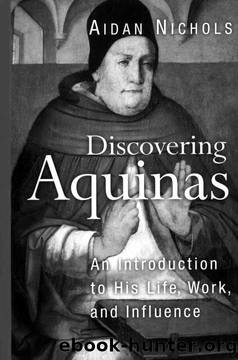Discovering Aquinas: An Introduction to His Life, Work, and Influence by Aidan Nichols

Author:Aidan Nichols
Language: eng
Format: epub
Published: 2009-02-06T22:38:00+00:00
Grace and sin
The grace of God, as it enters on the scene, profoundly modifies the Aristotelian picture. Of course, simply to state what the actual end of man now is (even while prescinding from the virtues as ways to attain that supreme good) requires some reference to grace. The revelation of our final end as the supernatural enjoyment of God the Trinity is already in itself the work of divine grace. But Thomas could hardly confine grace to simply the disclosure, by the lumen propheticum to the prophets and apostles, and the lumen fldei to the members of the Church built thereon, of our supernatural ultimate end. Over and above the lumen gratiae, if we are to attain to that supernatural end, and the natural end which is now its instrument, we have need of grace to penetrate and affect our being, both as individuals and as a corporate body.
It is, clearly, far from the case that human life in this world as we now experience it consists in an unbroken process of acquiring moral and intellectual virtue, all directed towards not only the natural enjoyment of God in his creation but the supernatural enjoyment of the Trinity, and at all points assisted by the helpful efforts of society and its members. Against the background of the true finality of human living, we have to say that human beings, individually and corporately, are in a condition of disorientation and discord. This disorientation and discord can only be grasped philosophically when we see them as the privation of an antecedent state of integration, just as they can only be grasped theologically when we see them as our loss of the original creation relationship with God, that original justice or righteousness the loss of which we call `original sin'. It is no longer the case that our intellect is subject to God, nor the lower powers of the soul to the intellect, nor the body to the soul. 19
On the personal level, it is the unruliness of our feelings that brings this home to us. According to Thomas, our appetite for sense objects is not only capable of but positively calls out for the controlling care of reason. Appetite is not simply to be repressed by the action of the will, for owing to the nature of the human being as a complex unity of which intellect is the superordinate function, our passions are frustrated unless they share in rationality.20 Our appetites are perfected in their human quality by finding contentment in their own proper scope - by loving limited objects for neither more nor less than what those objects are worth. And owing to original sin, ratified by personal sin, this cannot happen without the healing of these powers by the infused moral virtues, while the fact that we are now placed within a supernatural order where such virtues are called into play in order to subserve a more-than-natural goal means that the theological virtues are likewise relevant to how our emotions function in a Christian sensibility.
Download
This site does not store any files on its server. We only index and link to content provided by other sites. Please contact the content providers to delete copyright contents if any and email us, we'll remove relevant links or contents immediately.
The Lost Art of Listening by Michael P. Nichols(7494)
Why I Am Not A Calvinist by Dr. Peter S. Ruckman(4148)
The Rosicrucians by Christopher McIntosh(3510)
Wicca: a guide for the solitary practitioner by Scott Cunningham(3167)
Signature in the Cell: DNA and the Evidence for Intelligent Design by Stephen C. Meyer(3130)
Real Sex by Lauren F. Winner(3014)
The Holy Spirit by Billy Graham(2944)
To Light a Sacred Flame by Silver RavenWolf(2814)
The End of Faith by Sam Harris(2733)
The Gnostic Gospels by Pagels Elaine(2527)
Waking Up by Sam Harris(2454)
Nine Parts of Desire by Geraldine Brooks(2360)
Jesus by Paul Johnson(2352)
Devil, The by Almond Philip C(2324)
The God delusion by Richard Dawkins(2305)
Heavens on Earth by Michael Shermer(2278)
Kundalini by Gopi Krishna(2180)
Chosen by God by R. C. Sproul(2161)
The Nature of Consciousness by Rupert Spira(2104)
